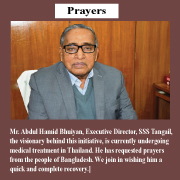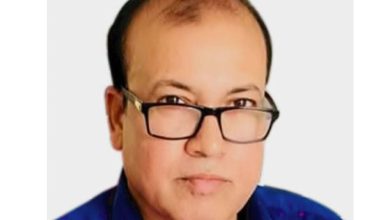Samadan’s Rezaul Karim opens up on challenges, opportunities, and the way forward


Holiday Post Report: Md. Rezaul Karim, Executive Director of SAMADAN and a recognized voice in Bangladesh’s microfinance sector, sat with Holiday Post to unpack the current dynamics of the microfinance landscape. Speaking in a calm but commanding tone, he gave a clear-eyed view of the sector’s achievements and pain points, offering policy insights and leadership advice from his long professional journey.
“The microfinance sector in Bangladesh has achieved remarkable success in expanding financial inclusion, especially for the poor and vulnerable,” Karim began. “We’ve seen clear progress—rising loan disbursement, growth in customer savings, and real improvement in women’s empowerment. Microfinance has sparked rural business development, created jobs, and lifted living standards. But challenges persist.”
Over-indebtedness tops the list, Karim warned, as borrowers often juggle loans from multiple sources. “That creates risk,” he said. “And while interest rates are lower than traditional moneylenders, they still place a heavy burden on those with limited incomes.”
On the institutional side, Karim pointed to weaknesses in physical and organizational infrastructure, unplanned lending, weak group formation, and flawed supervision. “High transaction costs and flawed management hurt both borrowers and lenders,” he noted. “Add to that the complexities of documentation, regulatory hurdles, and cultural barriers—and it’s clear that MFIs are under real strain.”
Still, he acknowledged the efforts underway to address those gaps. “We’re seeing slow but steady adoption of digital tools. There’s work being done to strengthen regulatory frameworks, but more needs to be done to reduce bureaucracy and eliminate systemic limitation.”
Karim offered a mixed review of the government’s regulatory approach. “Policies can help with financial inclusion and protect vulnerable groups. But overregulation increases operational costs and blocks innovation. The Microcredit Regulatory Authority (MRA) has done well to establish basic rules, but it’s time to move beyond just oversight and focus on digital integration and market expansion.”
He advocated for clear financial management policies. “Good financial policies help define how we operate. From lending guidelines to savings protocols—they’re the backbone of stability. And if MRA can implement the Credit Information Bureau (CIB) system across MFIs, it’ll help reduce default risk and expand lending. Also, removing the lien system and lowering bank interest rates will make microfinance more effective.”
Karim pushed for support beyond just finance. “Business Development Support Initiatives can change the game. Training in marketing, financial literacy, and enterprise management gives clients the tools to sustain their ventures. That’s where long-term success lies.”
As for the future, Karim is clear: “If we want to hit our Sustainable Development Goals (SDGs) by 2041, microfinance must stay climate-conscious. Rural borrowers—especially women—are on the frontlines of climate change. Floods, droughts, and cyclones disrupt repayment and destroy livelihoods. We need a microfinance framework built for climate resilience.”
He stressed that digital innovation is the sector’s lifeline. “With 731 licensed MFIs serving over 40 million people, the shift to mobile platforms, customized products, and digital savings isn’t just smart—it’s survival. These tools connect the unbanked to the formal economy. That’s empowerment.”
Karim also underlined his organization’s commitment to responsible lending. “We finance clean energy, sustainable agriculture, and women-led projects. We track impact—carbon reduction, job creation, and outreach to women. That information to helps us stay accountable.”
Looking ahead, Karim said long-term success hinges on clear priorities: “Expand access, promote entrepreneurship, strengthen market links, create productive employment, support vocational training, and stay socially responsible. That’s our roadmap.”
As the conversation wound down, Karim offered advice to his peers: “Be visionary. Understand your purpose. Stay close to your clients. Collaborate. Innovate. Manage risk. Train your teams. Build trust.”
Finally, he reflected on his journey. “In a country where women once had little access to finance, I’ve seen microcredit change lives. I’ve seen women start poultry farms, tailoring shops, handicraft ventures. It’s not just money—it’s power, independence, and dignity.”
Karim’s message was crystal clear: microfinance in Bangladesh is not static—it’s a force in motion, facing headwinds but armed with purpose, tools, and leaders ready to evolve.



